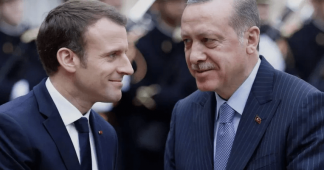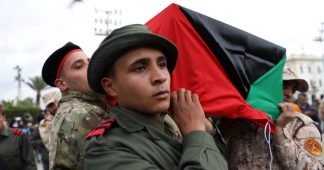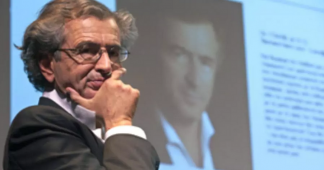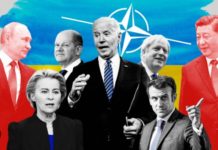By Dr. Karin Kneissl
Jul.27, 2020
A confrontation between the two NATO states France and Turkey continues to trouble the Mediterranean region; Egyptian forces are mobilizing. And many other military players are continuing operations there.
In March 2011, during a hectic weekend, the French delegation to the UN Security Council managed to convince all other member States of the Council to support Resolution 1973. It was all about a “humanitarian corridor” for Benghazi, which was considered the “good opposition” by the government of Nicolas Sarkozy. One of his whisperers was the controversial philosopher Bernard-Henri Levy, who supported a French intervention. Levy, fond of the “humanitarian war,” found a congenial partner in Sarkozy.
France was at root of crisis
Muammar Gaddafi had been received generously with all his tents in the park of the Elysée, but suddenly he was coined the bad guy. The same had happened to Saddam Hussein in Iraq. It was not the Arab dictator who had changed; it was his usefulness to his allies. The Libyans had been distributing huge amounts of money in Europe, in particular in Rome and Paris at various levels. In certain cases they knew too much. Plus, the Libyans had been protecting the southern border of the Mediterranean for the European Union.
So, the French started the war in 2011, took the British on board, which made the entire adventure look a bit like a replay of the Suez intervention of 1956, the official end of European colonial interventions. A humanitarian intervention changed into regime change on day two, which was March 20, 2011. Various UN Security Council members felt trapped by the French.
The US was asked to help, with then-Secretary of State Hillary Clinton and many other advisers in favor of joining that war. President Obama, however, was reluctant but, in the end, he gave in. In one of his last interviews while still in the White House, Obama stated that the aftermath of the war in Libya was his “worst mistake.”
Libya ever since has mostly remained a dossier in the hands of administrative officials in Washington, but not on the top presidential agenda anymore. This practice has been slightly shifting in the past weeks. US President Donald Trump and France’s Emmanuel Macron had a phone conversation on how to deescalate the situation there. Trump also spoke on that very topic with Turkish President Recep T. Erdogan. Paris supports General Haftar in his war against the Turkish-backed Government of National Accord, which is also supported by the European Union, in theory…
The triggering momentum for the current rise in tensions was a naval clash between French- and Turkish-supported vessels. Both nations are NATO members, and an internal alliance investigation is underway. But France decided to pull out of the NATO naval operation that enforces the Libya arms embargo, set up during the high-level Berlin conference on Libya in mid-January 2020. Without the French vessels it will be even more toothless than its critics already deem it. This very initiative on Libya was the first test for the new European commission headed by Ursula von der Leyen and claiming to be a “geopolitical commission.” The EU strives to speak the language of power but keeps failing in Libya, where two members, namely Italy and France, are pursuing very different goals. Rome is anxious about migration while Paris cares more about the terrorist threat. But both have an interest in commodities
It’s about oil and gas
When Gaddafi was reintegrated in the “community of the good ones” in early 2004 after a curious British legal twisting on the Lockerbie attack of December 1988, a bonanza for oil and gas concessions started. The Italian energy company ENI and BP were among the first to have a big foot in the door. I studied some of those contracts and asked myself why companies were ready to accept such terms. The answer was maybe in the then rise in the oil price of oil and the proximity of Libya to the European market.
Interestingly, in September 2011, the very day of the opening ceremony of the Paris conference dubbed “Friends of Libya,” a secret oil deal for the French company Total was published by the French daily Libération. The “good opposition” had promised the French an interesting range of oil concessions. Oil production continuously fell with the rise of the war, attracting sponsors, militias and smugglers from all horizons. The situation in Libya has since been called ‘somalization,’ but it would become even worse, since many more regional powers got involved in Libya than ever was the case in hunger-ridden Somalia.
In exchange for its military assistance, Turkey recently gained access to exploration fields off Libya’s shores. Ankara had identified an “exclusive economic zone” with the government in Tripoli, which disregards the UN Convention on the Law of the Sea. Actually, Israel made the same bilateral demarcation with Cyprus about ten years ago, when Noble Energy started its delineation of blocs in the Levant Basin. So Turkey is infringing on Greek and Cypriot territorial waters, while President Macron keeps reminding his EU colleagues of the “other actors” in the Mediterranean Sea. Alas, it is nobody’s “mare nostrum” as it was 2,000 years ago in the Roman era. In principle, all states which have ratified the UN Convention on the Law of the Sea should simply comply with their legal obligations.
The crucial question remains: who has which leverage to de-escalate? Is it the US President, who seemingly has acted more wisely on certain issues in recent times? Or will Russian and Turkish diplomacy be able to negotiate and implement a truce? The tightrope-walk diplomacy between these last two countries is a most interesting example of classical diplomacy: interest-based and focused; able to conduct hard-core relations even in times of direct military confrontation and assassinations (remember the Russian Ambassador Karlov, shot by his Turkish bodyguard in Ankara in December 2016?).
Meanwhile, yet another actor could move in to complicate everything even more. On July 20, the Egyptian parliament voted unanimously for the deployment of the national army outside its borders, thereby taking the risk of direct confrontation with Turkey in Libya. Egyptian troops would be mobilized in support of the eastern forces of General Khalifa Haftar. Furthermore, Cairo would thereby compete even more obviously with Algeria, spending a fortune on military control of its border with Libya. Algeria in the past could rely on US support in the region, but with the gradual decline in US engagement in that part of the world, the country faces a fairly existential crisis.
There are currently two powers, among those involved in Libya, that can still contain the next stage of a decade of proxy wars started by a French philosopher and various EU oil interests: Russia and the USA.
* Dr. Karin Kneissl, who works as an energy analyst and book author. She served as the Austrian minister of foreign affairs between 2017-2019. She is currently writing her book ‘Die Mobilitätswende’ (Mobility in transition), to be published this summer.











